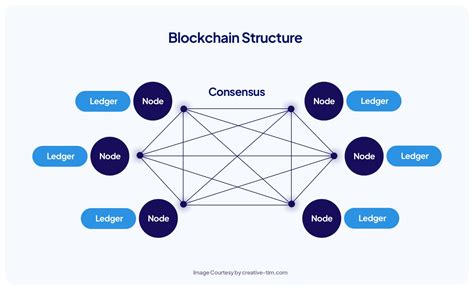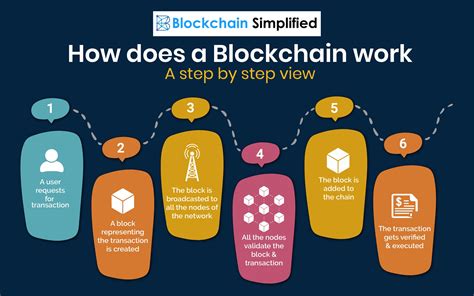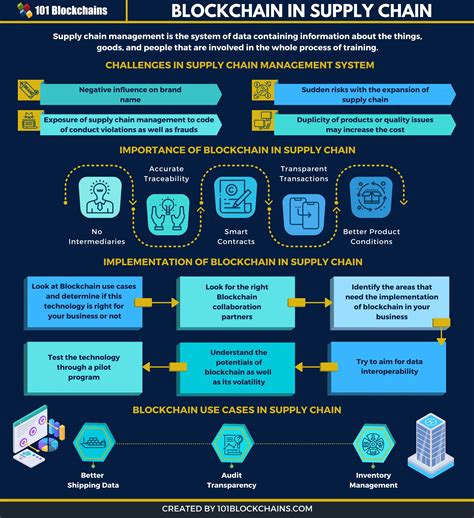Breaking News


Popular News


Learn about the potential of blockchain technology to disrupt various industries including finance, supply chain management, and healthcare. Understand its impact and future disruptions.Blockchain technology has been making headlines in recent years for its potential to revolutionize various industries. In this blog post, we will delve into the world of blockchain and explore its impact on different sectors. We will start by explaining the basics of blockchain technology, providing a clear understanding of what it is and how it works. Then, we will explore its potential to disrupt the financial sector, supply chain management, and the healthcare industry. We will discuss how blockchain has the power to transform these industries by improving transparency, security, and efficiency. Lastly, we will look into the future of blockchain disruption and the possibilities it holds for shaping the way businesses and organizations operate. Join us on this journey as we unravel the potential of blockchain technology to bring about significant changes across various sectors.
Contents

Blockchain is a decentralized, distributed ledger technology that has the potential to revolutionize the way information is stored and shared. It is essentially a digital ledger of transactions that is duplicated and distributed across the entire network of computer systems on the blockchain. This means that every user on the network can access the entire chain of transactions, making it a transparent and secure way of recording data.
One of the key features of blockchain is its immutability. Once data is recorded on a blockchain, it is extremely difficult to alter or delete. This makes it an ideal technology for recording and storing sensitive information, such as financial transactions or medical records.
The way blockchain works is through a network of nodes that validate and record transactions. These transactions are then added to a block of data, which is then linked to the previous block, creating a chain. This chain of blocks is constantly growing as new transactions are added, hence the name blockchain.
Overall, blockchain has the potential to disrupt a wide range of industries, from finance to healthcare, by providing a secure and transparent way of recording and sharing data. Its decentralized nature makes it resistant to tampering and fraud, and its potential applications are vast and diverse.

Blockchain technology is a distributed ledger system that allows data to be stored and recorded in a secure and decentralized manner. It is essentially a digital database that is maintained by a network of computers, rather than a centralized authority. Each block in the blockchain contains a list of transactions, and once a block is filled with data, it is linked to the previous block, creating a chain. This makes it virtually impossible for the data to be altered without the consensus of the network.
One of the key features of blockchain technology is its transparency and immutability. Once a transaction is recorded on the blockchain, it is visible to all the participants in the network, and it cannot be erased or modified. This makes it an ideal solution for industries that require secure and verifiable transactions, such as finance, supply chain, and healthcare.
The potential applications of blockchain technology are vast, and it has the power to disrupt several industries. In the financial sector, blockchain can revolutionize the way transactions are conducted, making them faster, cheaper, and more secure. In supply chain management, blockchain can provide a transparent and traceable record of the journey of a product from its origin to the consumer. In healthcare, blockchain can ensure the integrity and privacy of patient data, while also streamlining processes for healthcare providers.
In conclusion, blockchain technology has the potential to revolutionize the way data is stored and transactions are conducted across various industries. Its decentralized and secure nature makes it an attractive solution for businesses looking to enhance the transparency, security, and efficiency of their operations.

Blockchain technology has the potential to significantly disrupt the financial sector. With its decentralized and secure nature, blockchain has the ability to revolutionize the way transactions are conducted, making them faster, more efficient, and less costly.
One of the key advantages of blockchain in the financial industry is the elimination of intermediaries. Traditional financial transactions often involve multiple intermediaries, leading to delays and increased costs. However, with blockchain, transactions can be carried out directly between parties, reducing the need for intermediaries and streamlining the process.
Furthermore, the transparency and immutability of blockchain technology make it an ideal solution for combating fraud and ensuring the integrity of financial transactions. The use of blockchain in areas such as smart contracts can automate and enforce the terms of agreements, reducing the risk of disputes and fraudulent activities.
Overall, the impact of blockchain on the financial sector has the potential to reshape the way financial transactions are carried out, leading to greater efficiency, cost savings, and security.

Blockchain technology has the potential to revolutionize the way supply chain management is conducted. The use of blockchain in supply chain management can help in creating a more transparent, efficient, and secure system for tracking the movement of goods. This technology allows for the creation of a decentralized and immutable ledger that records every transaction, thereby providing a clear and trustworthy record of every step in the supply chain process.
By employing blockchain in supply chain management, companies can ensure the authenticity of their products, reduce the risk of fraud, and minimize the need for intermediaries. The implementation of smart contracts on the blockchain can automate various processes within the supply chain, such as payment settlements, delivery verifications, and product traceability, resulting in cost savings and improved operational efficiency.
In addition, the utilization of blockchain technology in supply chain management offers increased visibility and real-time monitoring of product movements. This can help in streamlining operations, identifying potential bottlenecks, and addressing issues promptly, ultimately leading to enhanced customer satisfaction and loyalty. Furthermore, the decentralized nature of blockchain ensures that the data is secure and cannot be tampered with, thus providing greater trust and assurance across the supply chain network.
Overall, the integration of blockchain in supply chain management has the potential to disrupt traditional practices, optimize processes, and bring about a new era of reliability and transparency in the global supply chain industry.

Blockchain technology has the potential to revolutionize the healthcare industry by providing a secure and transparent way to store and share medical data. With blockchain, patient records can be securely and efficiently stored and accessed by authorized healthcare providers, improving the overall quality of patient care. Additionally, blockchain can streamline the process of tracking pharmaceuticals, ensuring the authenticity and safety of medications throughout the supply chain.
One of the key benefits of implementing blockchain in the healthcare industry is the security it offers. By using cryptography and decentralized storage, blockchain can protect sensitive patient information from unauthorized access and tampering. This can help prevent data breaches and improve patient privacy, fostering greater trust between patients and healthcare providers.
Furthermore, blockchain technology can help address the challenge of interoperability within the healthcare system. By creating a shared, immutable record of patient data, healthcare professionals can access a comprehensive view of a patient’s medical history, regardless of where they have received care. This can lead to more efficient treatment decisions, reduced medical errors, and ultimately, improved patient outcomes.
| Benefits of Blockchain in Healthcare |
|---|
| Enhanced Security and Privacy |
| Improved Interoperability |
| Streamlined Data Sharing |

Blockchain technology has shown great potential for disrupting various industries in the future. The ability to create secure, transparent, and efficient data-sharing networks through blockchain has the potential to revolutionize the way many industries operate. As industries continue to embrace the digital transformation, blockchain stands out as a technology that could bring about significant changes in the coming years.
With its decentralized nature and immutable ledger, blockchain has the potential to bring about disruption in industries such as finance, healthcare, supply chain management, and more. The technology offers solutions for issues related to trust, security, and transparency, which are crucial in these sectors. As more companies and organizations begin to explore the possibilities of blockchain, the disruption it brings to traditional business models is becoming increasingly evident.
In the financial sector, blockchain has already started to make a significant impact, with the potential to streamline processes, reduce costs, and improve security. The technology can facilitate faster and more secure transactions, eliminate the need for intermediaries, and provide greater transparency in financial operations. As a result, traditional financial institutions are starting to adopt blockchain solutions to stay competitive in the evolving market.
Similarly, in the healthcare industry, blockchain has the potential to improve data interoperability, secure patient records, and streamline administrative operations. This could lead to better patient outcomes, reduced administrative costs, and improved overall efficiency. With the potential to disrupt various aspects of healthcare, blockchain technology is gaining attention from healthcare providers and stakeholders looking to optimize their operations.

What is blockchain?
Blockchain is a distributed, decentralized ledger technology that records transactions across many computers in such a way that the recorded transactions cannot be altered retroactively.
How can blockchain disrupt industries?
Blockchain has the potential to disrupt industries by providing secure, transparent, and immutable record-keeping, reducing fraud and increasing trust in transactions.
Which industries can be disrupted by blockchain?
Industries such as finance, supply chain management, healthcare, real estate, and voting systems can be disrupted by blockchain technology.
What are the benefits of using blockchain in industries?
Some benefits of using blockchain in industries include increased security, reduced costs, faster transactions, and improved transparency.
Are there any challenges associated with implementing blockchain in industries?
Yes, challenges such as scalability, interoperability, regulatory uncertainty, and the need for skilled professionals exist when implementing blockchain in industries.
How is blockchain being used in real-world applications?
Blockchain is being used in real-world applications such as cross-border payments, supply chain tracking, digital identity verification, and tokenization of assets.
What are some future possibilities for blockchain in disrupting industries?
Future possibilities for blockchain in disrupting industries include smart contracts, decentralized finance (DeFi), and the tokenization of traditional assets, leading to a more efficient and transparent global economy.